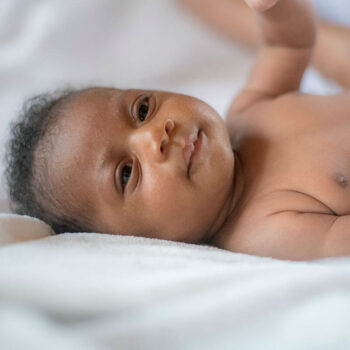Get a more complete picture of your pregnancy with PreSeek®
Assesses
30
Genes
Introducing PreSeek®, the first clinical noninvasive prenatal multigene sequencing screen.
PreSeek® screens for various clinically significant and life-altering genetic disorders that are not screened for with current NIPT technology. Disorders screened by this innovative test often occur in the absence of a family history of the condition. The screen, developed by the genomic experts at Baylor Genetics in conjunction with Baylor College of Medicine, assesses fetal DNA for pathogenic and likely pathogenic variants in 30 genes. PreSeek® is the next step in the evolution of screening for genetic disorders during pregnancy, providing information that can affect medical decisions, preparation, and peace of mind for families and physicians. Simply put, PreSeek® is the most comprehensive single gene cell-free fetal DNA screen available.
The difference in detecting a significant genetic disorder in the first/second trimester versus late in pregnancy, or in the neonatal period, can be of immeasurable benefit to healthcare providers and families.
Many disorders in PreSeek® are not typically associated with abnormal prenatal ultrasound findings (especially in the first trimester), or may not be evident until late second/third trimester or after delivery. Although the occurrence of each disorder is relatively rare, the cumulative rate of occurrence of these conditions is similar to that of Down Syndrome.
Knowing whether or not a baby has one of these significant, and often devastating, genetic disorders can allow for healthcare providers and families to form a plan of care including, but not limited to, genetic counseling, specialist referrals, confirmatory studies, and delivery care.


Disorders Screened by PreSeek®
GENE |
DISORDER |
|---|---|
JAG1 |
Alagille syndrome |
CHD7 |
CHARGE syndrome |
NIPBL |
Cornelia de Lange syndrome 1 |
SMC1A |
Cornelia de Lange syndrome 2 |
SMC3 |
Cornelia de Lange syndrome 3 |
RAD21 |
Cornelia de Lange syndrome 4 |
HDAC8 |
Cornelia de Lange syndrome 5 |
CDKL5 |
Epileptic encephalopathy, early infantile, 2 |
SYNGAP1 |
Intellectual disability |
MECP2 |
Rett syndrome |
NSD1 |
Sotos syndrome 1 |
TSC1 |
Tuberous sclerosis 1 |
TSC2 |
Tuberous sclerosis 2 |
| GENE | DISORDER |
|---|---|
| FGFR3 | Achondroplasia |
| CATSHL syndrome | |
| Crouzon syndrome with acanthosis nigricans | |
| Hypochondroplasia | |
| Muenke syndrome | |
| Thanatophoric dysplasia, type I | |
| Thanatophoric dysplasia, type II | |
| COL1A1 | Ehlers-Danlos syndrome, classic |
| Ehlers-Danlos syndrome, type VIIA | |
| Osteogenesis imperfecta, type I | |
| Osteogenesis imperfecta, type II | |
| Osteogenesis imperfecta, type III | |
| Osteogenesis imperfecta, type IV | |
| COL1A2 | Ehlers-Danlos syndrome, cardiac valvular form |
| Ehlers-Danlos syndrome, type VIIB | |
| Osteogenesis imperfecta, type II | |
| Osteogenesis imperfecta, type III | |
| Osteogenesis imperfecta, type IV |
GENE |
DISORDER |
|---|---|
BRAF |
Cardiofaciocutaneous syndrome 1 |
MAP2K1 |
Cardiofaciocutaneous syndrome 3 |
MAP2K2 |
Cardiofaciocutaneous syndrome 4 |
HRAS |
Costello syndrome/Noonan syndrome |
PTPN11 |
Noonan syndrome 1/LEOPARD syndrome/cancers |
SOS1 |
Noonan syndrome 4 |
RAF1 |
Noonan syndrome 5/LEOPARD syndrome 2 |
NRAS |
Noonan syndrome 6/cancers |
RIT1 |
Noonan syndrome 8 |
SOS2 |
Noonan syndrome 9 |
SHOC2 |
Noonan syndrome-like disorder with loose anagen hair |
CBL |
Noonan syndrome-like disorder with or without juvenile myelomonocytic leukemia (NSLL) |
KRAS |
Noonan syndrome/cancers |
| GENE | DISORDER |
|---|---|
| FGFR2 | Antley-Bixler syndrome without genital anomalies or disordered steroidogenesis |
| Apert syndrome | |
| Crouzon syndrome | |
| Jackson-Weiss syndrome | |
| Pfeiffer syndrome type 1/2/3 |
Begin your discovery with PreSeek®
PreSeek® Test Requirements
Gestational Age
Minimum of 9 Weeks
Maternal
Peripheral Blood in Two 10ml Cell-free DNA BCT® Streck Tubes
Test Code
2210
PreSeek® Test Resources
SAMPLE TYPE |
REQUIREMENTS |
SHIPPING CONDITIONS |
|---|---|---|
Blood |
Maternal specimen requirement is blood collected in two (2) Streck tubes. Each Streck tube must have at least 8mL of blood. |
Ship at ambient temperature in an insulated container by overnight courier. Do not heat or freeze. We recommend samples are received in lab If Streck tube is received in lab >8 days after DOC, the sample will be rejected. |
A summary of the technical details of PreSeek® in validation and commercial samples.
Read the full white paper.
How It Works
Order appropriate testing for your patient.
The patient’s sample is collected.
The patient’s sample is sent to Baylor Genetics.
Results are sent to the physician.
Discuss the results with the patient.
Disclaimer: PreSeek® is a screening test. This means that pregnancy decisions should not be based solely on the results of PreSeek®. The purpose of PreSeek® is to indicate if the baby is at increased risk for a genetic disorder allowing for follow-up invasive prenatal studies or newborn studies. Performing this screening allows for an assessment for known pathogenic and likely pathogenic variants in select genes associated with select disorders. PreSeek® should be offered in conjunction with genetic counseling, including review of family history, to help determine the most appropriate prenatal studies for any pregnant woman.